|
|
|
Sort Order |
|
|
|
Items / Page
|
|
|
|
|
|
|
| Srl | Item |
| 1 |
ID:
125920
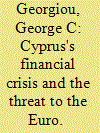

|
|
|
|
|
| Publication |
2013.
|
| Summary/Abstract |
This essay analyzes Cyprus's financial crisis and its potential threat to the eurozone. The focus is on the economic consequences of the terms of the bailout agreement dictated by the Troika or Eurogroup for the Cyprus economy as well as its significance for any future bailouts. Given the insignificant size of the Cypriot economy for the eurozone as a whole, the Cyprus case was treated more as a political exercise and held up as an example for other eurozone members rather than seen as a serious economic threat, while little attention was given to its potential as a precedent for future bailouts.
|
|
|
|
|
|
|
|
|
|
|
|
|
|
|
|
| 2 |
ID:
125917
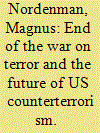

|
|
|
|
|
| Publication |
2013.
|
| Summary/Abstract |
The "Global War on Terror" came to dominate US foreign policy in the wake of the 9/11 attacks. The effort served as a guiding light for how the United States interacted with friends, allies, and adversaries and deeply influenced US priorities around the globe, in general, and in the wider Middle East, in particular. While it will likely never be announced as concluded, the Global War on Terror is effectively over, due to four separate but related reasons: the killing of Osama bin Laden, the perceived failure of counterinsurgency as an effective policy instrument, the significant costs of the effort, and the Arab Awakening. This does not mean, however, that the United States will no longer pursue counterterrorists. Drones and special forces have emerged as the key tools in US counterterrorism, and the United States is likely to continue pursuing terrorist cells and high-value targets aggressively across the globe for decades to come using these means. However, this practice should be viewed as one of many defense efforts that the United States carries out on a regular basis in order to guard the full range of US interests. Elements of the emerging US counterterrorism effort remain problematic, but the end of the Global War on Terror nevertheless presents Washington with a window of opportunity to reorder its relations with the nations and peoples of the Middle East and North Africa and frees up resources for the United States to tackle other emerging strategic priorities, such as the shift of global power to the Pacific, the revival of the US economy, and security challenges such as energy security and cyber defense.
|
|
|
|
|
|
|
|
|
|
|
|
|
|
|
|
| 3 |
ID:
125919
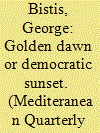

|
|
|
|
|
| Publication |
2013.
|
| Summary/Abstract |
This essay traces the history of the Far Right in Greece, which is on the rise again almost four decades after the collapse of the military junta that ruled the Mediterranean country from 1967 to 1974. The author examines how the Golden Dawn party capitalized on Greek citizens' anxieties brought about by economic crisis, illegal immigration issues, high unemployment rates, increases in crime, anti-austerity public sentiments, and the uncertainty over the country's future to become, in just a few years, a formidable political party in Greece.
|
|
|
|
|
|
|
|
|
|
|
|
|
|
|
|
| 4 |
ID:
125922
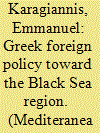

|
|
|
|
|
| Publication |
2013.
|
| Summary/Abstract |
Greece has enjoyed strong historical and cultural ties with countries and peoples of the Black Sea region for many centuries. During the 1990s, Greek governments largely ignored the region as they focused on the immediate Balkan neighborhood, which was in turmoil at the time. Since the early 2000s, however, Athens has developed a multidimensional policy toward the Black Sea region that deserves to be examined. This policy is based on a combination of hard and soft power resources, including economic might, military diplomacy, pipeline development, public diplomacy, multilateralism, and outreach based on political values, culture, and history. While the formation and implementation of the Greek foreign policy has remained in the hands of state officials and agencies, nonstate actors have had an important contributing role. The extent of Greek Black Sea policy's success and limitations are also discussed.
|
|
|
|
|
|
|
|
|
|
|
|
|
|
|
|
| 5 |
ID:
125916


|
|
|
|
|
| Publication |
2013.
|
| Summary/Abstract |
The first three months of 2013 represented an unusually significant period of political, economic, and social change around the Mediterranean, even by the region's standards. The world anxiously watched the ongoing civil war that has continued to tear apart Syria and divide the international community, and it was then surprised by the resignation of Pope Benedict XVI-the first pope to resign since Pope Gregory XII in 1415. Meanwhile, Cyprus was forced to accept a European Union bailout, which damaged its reputation as an offshore banking and financial tax haven for wealthy, mostly Russian, businessmen. These three key events-and certainly all of the essays presented in this issue of the Mediterranean Quarterly -demonstrate how interconnected the world is, especially with respect to issues that evolved from the Mediterranean region.
|
|
|
|
|
|
|
|
|
|
|
|
|
|
|
|
| 6 |
ID:
125924
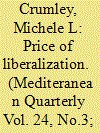

|
|
|
|
|
| Publication |
2013.
|
| Summary/Abstract |
Coffee is the second most traded commodity in the world, and it is one of the leading exports for eighteen sub-Saharan African countries. Seventy percent of coffee is grown by smallholder farmers. As global trade of coffee has grown, have smallholder coffee farmers benefited from increased internationalization of their economies? Liberal economic theory suggests that pressures caused by the internationalization of an economy widely affect preferences, institutions, and policies. This essay examines whether smallholder coffee farmers have wanted or been able to benefit from free trade and whether they support institutions that support greater free trade. Liberal economic theory emphasizes that producers and consumers change preferences as a result of internationalization of economies, so the response of smallholder farmers should be similar in all coffee-exporting countries. This essay finds that the theoretical model requires modifications for fully understanding coffee producers' preferences. Increases in retail prices were not reflected at the farm gate level. Moreover, the theory does not account for variables such as the International Coffee Agreement, international financial institutions, and fair trade, which influence price signals and opportunity costs.
|
|
|
|
|
|
|
|
|
|
|
|
|
|
|
|
| 7 |
ID:
125918


|
|
|
|
|
| Publication |
2013.
|
| Summary/Abstract |
Drawing on the author's time as the BBC's correspondent in Gaza from 2002 to 2004, this essay offers a way of understanding more fully the situation in Gaza in 2013, after the recent elections in the United States and Israel and following the Arab uprisings. The core argument is that any future analysis of the Israeli-Palestinian conflict must give greater weight to issues of faith and to the idea that land is not simply a commodity but something to which there is a strong, historical, almost spiritual connection. The essay makes the case that recent events in the Middle East make these issues increasingly important.
|
|
|
|
|
|
|
|
|
|
|
|
|
|
|
|
|
|
|
|
|